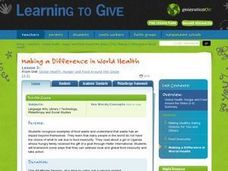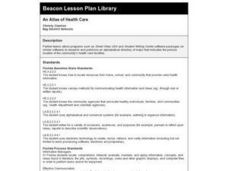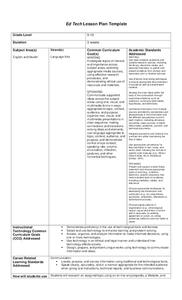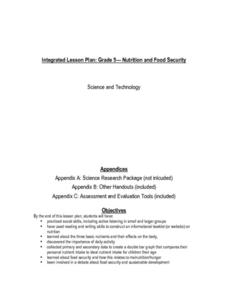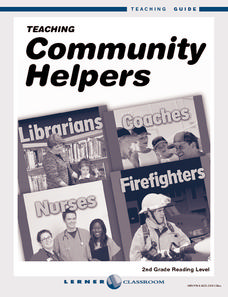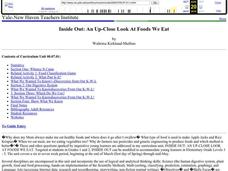Curated OER
"Asthma: Stopping Attacks Before They Start"
Students study facts about living with asthma. They examine medical treatments and lifestyle changes that can improve the life of asthmatics. They determine the cause and effect relationship.
Curated OER
Nutrition an Food: Taking Control of What You Eat
Students examine what they eat and how they can improve their health by changing what they eat. They research nutrition and different foods. They also examine new vocabulary words.
Curated OER
Controlling Substances
Students consider their own understanding of household safety, examine the latest remedy deemed poisonous by physicians, and research the hazards of household products. They create public service announcements regarding potential hazards.
Curated OER
How Smoking Affects Our Repiratory System
Seventh graders examine the dangers of smoking. In this life science lesson, 7th graders survey their schoolmates about the factors that would influence them to smoke. They present their findings in class by creating a presentation.
Curated OER
Your Body Within Your Community
Students identify and discuss the function of each of the major body systems. As a class, they discover how this relates each one of them in their community. They discuss their role as a member of their community and how people depend...
Curated OER
Opportunistic Diseases
Students explore the concept of opportunistic diseases. In this opportunistic diseases lesson, students take notes on a lecture regarding systemic herpes, candidiasis, cytomegalovirus, tuberculosis, MAC, recurrent pneumonia,...
Curated OER
Making a Difference in World Health
Students discover environmental awareness by conducting a collection project in class. In this global food lesson, students identify the importance of feeding all of the humans on Earth and discuss why some aren't properly nourished....
Curated OER
An Atlas of Health Care
Students use educational software to create an alphabetical directory of maps that indicates the precise location of the community's health care facilities.
Curated OER
V-R-A-N-T-S-I-S and Me
Students discuss themes and issues of culture, identity and self-esteem. They construct responses to those themes. Students profile themselves and try to answer questions about themselves tied to the themes of this activity.
Curated OER
Integrating Japanese into an Elementary School P¿¿DE¿¿DLesson
Students, working in teams of 2 or 3, create hiragana characters using their bodies.
Curated OER
Ed Tech
Students access and evaluate authority of electronic resources. They synthesize data from multiple sources. Students compose a Works Consulted page. They prepare and deliver an informative speech on a disease or medical condition.
Curated OER
Nutrition and Food Security
Examine the three basic nutrients and their effects on the body. Fifth graders will research data to construct a bar graph and then demonstrate the relationship between malnutrition and food security. This is a very comprehensive...
Lerner Publishing
Teaching Community Helpers
Youngsters discover who the leaders in their community are and what it means to build a community in this four-lesson unit.
Curated OER
"Four" Goodness Sake
Fourth graders recognize that ethnicity, religion and geography are reflected in the food choices we make. For this food choices lesson, 4th graders discuss different types of food from different places. Students compare a menu to the...
Curated OER
Inside Out: An Up-Close Look At Foods We Eat
Fourth graders identify the origins of meats and vegetables consumed by humans on a daily basis. They classify foods (meats, dairy products, grains...) and create a food pyramid.








